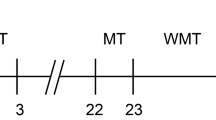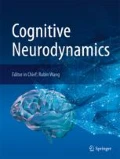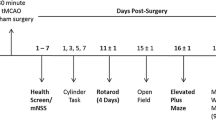Abstract
Cerebrovascular accident (CVA) is one of the leading causes of death and disability worldwide, as well as a major financial burden for health care systems. CVA rodent models provide experimental support to determine possible in vivo therapies to reduce brain injury and consequent sequelae. This study analyzed nociceptive, motor, cognitive and mood functions in mice submitted to distal middle cerebral artery (DMCA) occlusion. Male C57BL mice (n = 8) were randomly allocated to control or DMCA groups. Motor function was evaluated with the tests: grip force, rotarod and open field; and nociceptive threshold with von Frey and hot plate assessments. Cognitive function was evaluated with the inhibitory avoidance test, and mood with the tail suspension test. Evaluations were conducted on the seventh- and twenty-eighth-day post DMCA occlusion to assess medium- and long-term effects of the injury, respectively. DMCA occlusion significantly decreases muscle strength and spontaneous locomotion (p < 0.05) both medium- and long term; as well as increases immobility in the tail-suspension test (p < 0.05), suggesting a depressive-type behavior. However, DMCA occlusion did not affect nociceptive threshold nor cognitive functions (p > 0.05). These results suggest that, medium- and long-term effects of DMCA occlusion include motor function impairments, but no sensory dysfunction. Additionally, the injury affected mood but did not hinder cognitive function.




Similar content being viewed by others

Abbreviations
- CS:
-
Cerebral stroke
- CVA:
-
Cerebrovascular accident
- DMCA:
-
Distal middle cerebral artery
- min:
-
Minutes
- rpm:
-
Revolutions per minute
- s:
-
Seconds
References
Bacigaluppi M, Comi G, Hermann DM (2010) Animal models of ischemic stroke. Part one: modeling risk factors. Open Neurol J 4:26–33. https://doi.org/10.2174/1874205X01004020026
Bornas X, Noguera M, Balle M et al (2013) Long-range temporal correlations in resting EEG: its associations with depression related emotion regulation strategies. J Psychophysiol 27:60–66. https://doi.org/10.1027/0269-8803/a000087
Bouët V, Freret T, Toutain J, Divoux D, Boulouard M, SchumannBard P (2007) Sensorimotor and cognitive deficits after transient middle cerebral artery occlusion in the mouse. Exp Neurol 203:555–567. https://doi.org/10.1016/j.expneurol.2006.09.006
Braeuninger S, Kleinschnitz C (2009) Rodent models of focal cerebral ischemia: procedural pitfalls and translational problems. Exp Transl Stroke Med 1:8. https://doi.org/10.1186/2040-7378-1-8
Brooks SP, Dunnett SB (2009) Tests to assess motor phenotype in mice: a user’s guide. Nat Rev Neurosci 10:519–529. https://doi.org/10.1038/nrn2652
Burvill PW, Johnson GA, Jamrozik KD, Anderson CS, Stewart-Wynne EG, Chakera TM (1995) Prevalence of depression after stroke: the Perth Community Stroke Study. Br J Psychiatry 166:320–327. https://doi.org/10.1192/bjp.166.3.320
Craft TK, Glasper ER, McCullough L, Zhang N, Sugo N, Otsuka T et al (2005) Social interaction improves experimental stroke outcome. Stroke 36:2006–2011. https://doi.org/10.1161/01.STR.0000177538.17687.54
Dimitriadis SI, Laskaris NA, Micheloyannis S (2015) Transition dynamics of EEG-based network microstates during mental arithmetic and resting wakefulness reflects task-related modulations and developmental changes. Cogn Neurodyn 9:371–387. https://doi.org/10.10007/s11571-015-9330-8
Duverger D, Mackenzie ET (1988) The quantification of cerebral infarction following focal ischemia in the rat: influence of strain, arterial pressure, blood glucose concentration, and age. J Cereb Blood Flow Metab 8:449–461. https://doi.org/10.1038/jcbfm.1988.86
Fisher M, Feuerstein G, Howells DW, Hurn PD, Kent TA, Savitz SL et al (2009) Update of the stroke therapy academic industry roundtable preclinical recommendations. Stroke 40:2244–2250. https://doi.org/10.1161/STROKEAHA.108.541128
Gregory NS, Harris AL, Robinson CR, Dougherty PM, Fuchs PN, Sluka KA (2013) An overview of animal models of pain: disease models and outcome measures. J Pain 14:1255–1269. https://doi.org/10.1016/j.jpain.2013.06.008
Hackett ML, Yapa C, Parag V, Anderson CS (2005) Frequency of depression after stroke: a systematic review of observational studies. Stroke 36:1330–1340. https://doi.org/10.1161/01.STR.0000165928.19135.35
Hou D, Wang C, Chen Y, Wang W, Du J (2017) Long-range temporal correlations of broadband EEG oscillations for depressed subjects following different hemispheric cerebral infarction. Cogn Neurodyn 11:529–538. https://doi.org/10.1007/s11571-017-9451-3
Howells DW, Porritt MJ, Rewell SSJ, O’Collins V, Sena ES, Worp HBVD et al (2010) Different strokes for different folks: the rich diversity of animal models of focal cerebral ischemia. J Cereb Blood Flow Metab 30:1412–1431. https://doi.org/10.1038/jcbfm.2010.66
Hussain L (2018) Detecting epileptic seizure with different feature extracting strategies using robust machine learning classification techniques by applying advance parameter optimization approach. Cogn Neurodyn 3:271–294. https://doi.org/10.1007/s11571-018-9477-1
Johnson JK, Lui LY, Yaffe K (2007) Executive function, more than global cognition, predicts functional decline and mortality in elderly women. J Gerontol A Biol Sci Med Sci 62:1134–1141. https://doi.org/10.1093/gerona/62.10.1134
Kasner SE (2006) Clinical interpretation and use of stroke scales. Lancet Neurol 5:603–612. https://doi.org/10.1016/S1474-4422(06)70495-1
Kimura M, Robinson RG, Kosier JT (2000) Treatment of cognitive impairment after poststroke depression: a double-blind treatment trial. Stroke 31:1482–1486. https://doi.org/10.1161/01.STR.31.7.1482
Kotila M, Numminen H, Waltimo O, Kaste M (1998) Depression after stroke. Results of the FINNSTROKE Study. Stroke 29:68–72. https://doi.org/10.1161/01.STR.29.2.368
Kuraoka M, Furuta T, Matsuwaki T, Omatsu T, Ishii Y, Kyuwa S, Yoshikawa Y (2009) Direct experimental occlusion of the distal middle cerebral artery induces high reproducibility of brain ischemia in mice. Exp Anim 58:19–29
Lamti HA, Ben Khelifa MM, Hugel V (2019) Mental fatigue level detection based on event related and visual evoked potentials features fusion in virtual indoor environment. Cogn Neurodyn 3:271–285. https://doi.org/10.1007/s11571-019-09523-2
Lee JS, Yang BH, Lee JH et al (2007) Detrended fluctuation analysis of resting EEG in depressed outpatients and healthy controls. Clin Neurophysiol 118:2489–2496. https://doi.org/10.1016/j.clinph.2007.08001
Linkenkaer-Hansen K, Monto S, Rytsala H et al (2005) Breakdown of long-range temporal correlations in theta oscillations in patients with major depressive disorder. J Neurosci 25:10131–10137. https://doi.org/10.1523/JNEUROSCI.3244-05.2005
Lubjuhn J, Gastens A, Wilpert GV, Bargiotas P, Herrmann Murikinati OS et al (2009) Functional testing in a mouse stroke model induced by occlusion of the distal middle cerebral artery. J Neurosci Methods 184:95–103. https://doi.org/10.1016/j.jneumeth.2009.07.029
Machado A, Haertel LM (2013) Neuroanatomia funcional, 3rd edn. Atheneu, São Paulo
Martins DF, Turnes BL, Cidral-Filho FJ, Bobinski F, Rosas RF, Danielski LG, Petronilho F, Santos AR (2016) Light-emitting diode therapy reduces persistent inflammatory pain: role of interleukin 10 and antioxidant enzymes. Neuroscience 324:485–495. https://doi.org/10.1016/j.neuroscience.2016.03035
Martins DF, Martins TC, Batisti AP, Leonel LS, Bobinski F, Belmonte LAO, Martins LM, Ferreira EC, Santos ARS (2018) Long-term regular eccentric exercise decreases neuropathic pain-like behavior and improves motor functional recovery in an axonotmesis mouse model: the role of insulin-like growth factor-1. Mol Neurobiol 55:6155–6168. https://doi.org/10.1007/s12035-017-0829-3
Molina CA (2011) Reperfusion therapies for acute ischemic stroke: current pharmacological and mechanical approaches. Stroke 42:16–19. https://doi.org/10.1161/STROKEAHA.110.598763
Moretti M, Budni J, Freitas AE, Rosa PB, Rodrigues AL (2013) Antidepressant-like effect of ascorbic acid is associated with the modulation of mammalian target of rapamycin pathway. J Psychiatr Res 48:16–24. https://doi.org/10.1016/j.jpsychires.2013.10014
Mozzafarian D, Benjamin EJ, Go AS, Arnett DK, Blaha MJ, Cushman M et al (2016) Heart disease and stroke statistics-2016 update: a report from the American heart association. Circulation 133(4):e38–360. https://doi.org/10.1161/CIR.0000000000000350
O’Collins VE, Macleod MR, Donnan GA, Horky LL, Worp van der BH, Howells DW (2006) 1026 experimental treatments in acute stroke. Ann Neurol 59:467–477, 62:1134–1141. https://doi.org/10.1002/ana.20741
O’Keefe J, Nadel L (1978) The hippocampus as a cognitive map. Oxford University Press, Oxford
Oliveira JL, Crispin PD, Duarte EC, Marloch GD, Gargioni R, Trentin AG, Silva MA (2014) Histopathology of motor cortex in an experimental focal ischemic stroke in mouse model. J Chem Neuroanat 57–58:1–9. https://doi.org/10.1016/j.jchemneu.2014.03002
Redish AD, Touretzky DS (1997) Beyond the cognitive map. Ph.D. thesis, Department of Computer Science, Carnegie Mellon University, Pittsburg
Robinson RG, Bolduc PL, Price TR (1987) Two-year longitudinal study of poststroke mood disorders: diagnosis and outcome at one and two years. Stroke 18:837–843. https://doi.org/10.1161/01.STR.18.5.837
Robinson RG et al (1997) Neuropsychiatric consequences of stroke. Annu Rev Med 48:217–229. https://doi.org/10.1146/annurev.med.48.1.217
Robison R (2003) Poststroke depression: prevalence, diagnosis, treatment, and disease progression. Biol Psychiatry 54:376–387. https://doi.org/10.1016/S0006-3223(03)00423-2
Rosell A, Agin V, Rahman M, Morancho A, Ali C, Koistinaho J et al (2013) Distal occlusion of the middle cerebral artery in mice: are we ready to assess long-term functional outcome? Transl Stroke Res 4:297–307. https://doi.org/10.1007/s12975-012-0234-1
Steru L, Chermat R, Thierry B, Simon P (1985) The tail suspension test: a new method for screening antidepressants in mice. Psychopharmacology 85:367–370. https://doi.org/10.1007/BF00428203
Szapiro G, Galante JM, Barros DM et al (2002) Molecular mechanisms of memory retrieval. Neurochem Res 27:1491–1498. https://doi.org/10.1023/A:1021648405461
Tamaki K, Nakai M, Yokota T, Ogata J (1995) Effects of aging and chronic hypertension on cerebral blood flow and cerebrovascular CO2 reactivity in the rat. Gerontology 41:11–17. https://doi.org/10.1159/000213657
Tarai S, Mukherjee R, Gupta S, Rizvanov AA, Palotás A, Chandrasekhar Pammi VS (2019) Influence of pharmacological and epigenetic factors to suppress neurotrophic factors and enhance neural plasticity in stress and mood disorders. Cogn Neurodyn 3:219–237. https://doi.org/10.1007/s11571-019-09522-3
Wang Y, Wang R, Zhu Y (2017) Optimal path-finding through mental exploration based on neural energy field gradients. Cogn Neurodyn 11:99–111. https://doi.org/10.1007/s11571-016-9412-2
Zhoua LYY, Wright TE, Clarkson AN (2016) Prefrontal cortex stroke induces delayed impairment in spatial memory. Behav Brain Res 296:373–378. https://doi.org/10.1016/j.bbr.2015.08.022
Zhu CZ, Auer RN (2004) Optimal blood glucose levels while using insulin to minimize the size of infarction in focal cerebral ischemia. J Neurosurg 101:664–668. https://doi.org/10.3171/jns.2004.101.4.0664
Acknowledgements
Supported by grants from Universidade do Sul de Santa Catarina Curso de Medicina and Programa Unisul de Iniciação Científica (PUIC), Coordenação de Aperfeiçoamento de Pessoal de Nível Superior (CAPES), Conselho Nacional de Desenvolvimento Científico e Tecnológico (CNPq—430556/2018-7 and 309407/2017-6), and Fundação de Amparo a Pesquisa e Inovação do Estado de Santa Catarina (FAPESC-2019TR73), Brazil.
Author information
Authors and Affiliations
Corresponding author
Ethics declarations
Conflict of interest
The authors declare that they have no conflict of interest.
Additional information
Publisher's Note
Springer Nature remains neutral with regard to jurisdictional claims in published maps and institutional affiliations.
Rights and permissions
About this article
Cite this article
de Oliveira, J.L., Ávila, M., Martins, T.C. et al. Medium- and long-term functional behavior evaluations in an experimental focal ischemic stroke mouse model. Cogn Neurodyn 14, 473–481 (2020). https://doi.org/10.1007/s11571-020-09584-8
Received:
Revised:
Accepted:
Published:
Issue Date:
DOI: https://doi.org/10.1007/s11571-020-09584-8



